Abstract
The neuropeptide oxytocin (OXT) is involved in social bonding, reproduction, and childbirth. Its activity is mediated by the oxytocin receptor (OXTR), also expressed in the skin. OXT alleviates dermal fibroblast senescence, and OXT levels correlate with visible skin aging. OXT inhibits nociceptive signaling and promotes neuronal plasticity. Here, we demonstrate OXT-like benefits of OXTR activation for skin touch sensoriality and nociception, as well as visible skin health and beauty indicators, using an aqueous extract of Hyacinthus orientalis bulbs. OXTR activation was evaluated in a Chinese hamster ovary (CHO) cell model. Nociception and innervation benefits were investigated in keratinocyte/sensory neuron coculture models. A placebo-controlled clinical study evaluated gentle touch receptivity, nociception, skin tone, elasticity, and wrinkling. The extract activated OXTR and enhanced dermal fibroblast proliferation in vitro. In the keratinocyte-neuron coculture, the HO extract lowered nociceptive CGRP release below that of the unstimulated and OXT controls and promoted neuronal survival and dendricity. An organ-on-a-chip coculture showed decreased electrical activity and increased neuronal peripherin. Clinically, we observed selective left-side frontal alpha-wave activation, indicating pleasant sensation, reduced nociception, enhanced skin glow, improved elasticity, and reduced wrinkling. This extract thus shows high value for holistic wellbeing solutions, enhancing the skin’s receptivity to pleasant sensations and promoting well-aging.
1. Introduction
Oxytocin (OXT) is a widely known hypothalamic neuropeptide involved, inter alia, in social bonding and sexual reproduction [1,2,3,4]. OXT is also secreted in various tissue types in addition to the hypothalamus, including (but not limited to) various reproductive system tissues [5]. OXT has been associated with a wide range of emotional benefits and has received the popular moniker “love hormone”. The main pathway for the activity of oxytocin is mediated by the activation of the oxytocin receptor (OXTR), also expressed in many tissue types [6,7,8]. These include the skin, in which OXT and OXTR have been reported, including by Deing et al., in fibroblasts and keratinocytes [9]. The expression of OXT in human epidermal keratinocytes was also reported by Denda et al. [10,11], as well as by Fujimoto et al. [12], confirming that the OXT present in the skin is, at least in part, generated in local tissue, as opposed to being produced by the CNS. The presence of OXT has also been reported in human sweat. Its role there is somewhat unclear; interestingly, OT levels in sweat seemed stable for each individual tested, contrary to the levels measured in saliva. The group reporting this finding suggested it may play a local anti-nociceptive role [13].
Oxytocin release triggered by affective touch enhances pleasant tactile sensations by modulating neural activity in both C tactile afferent nerve sensors and the orbitofrontal cortex, a brain region involved in processing emotion and reward, creating a positive feedback loop that reinforces social bonding. The orbitofrontal cortex integrates this tactile information and oxytocin signaling with other sensory inputs to create the pleasant, rewarding experience associated with gentle touch. This complex neural pathway, enhanced by oxytocin, helps explain why social touch is so important for emotional wellbeing [14].
In addition to its role in bonding and reproduction, diverse biological roles of OXT and OXTR have been investigated.
For example, OXT and OXTR have also been reported to affect cell proliferation in several cell types [9,15,16]. More specifically, Arenkiel et al. have reviewed OXT’s and OXTR’s influence on neural plasticity in the sensory network, driving neuron proliferation, differentiation, and dendricity. The authors concluded that OXT promotes both neurogenesis and neuronal circuit integration—notably in adult mammals (as opposed to during ontogenesis) [17]. In the same direction, Taha et al. reported, based on an adipose tissue-derived stem cell model, that oxytocin treatment can promote proliferation and neural differentiation [18]; Bakos et al. reported that OXT contributed to neurite growth in vitro [19]; and Pandamooz et al. determined that OXTR contributes significantly to the proliferative effect of OXT observed in a neuronal spheroid model [20]. Alanazi et al. also reported that oxytocin promotes melanocyte proliferation, migration, and melanogenesis [21].
On the other hand, Condes-Lara et al. [22] highlighted an anti-nociceptive role for peripheral OXTR, demonstrating an OXT-mediated analgesia effect in Wistar rats and suggesting (as per Grinevich’s review of the Condes-Lara team’s work [23]) “the possibility of a strictly peripheral, skin-based, closed loop concept of oxytocin-induced analgesia”. This work showed that OXTR is expressed in terminal nerve endings, and its activation by subcutaneous OXT application can block formalin-induced nociceptive neuronal signaling. Blocking OXTR negated this effect. Together with the pro-innervation properties of OXT, this suggests that OXT signaling may be used to enhance skin tactile perception, both improving gentle touch sensoriality and reducing sensitivity to unpleasant sensation. It should be noted that other recent studies have indicated that, in addition to OXTR-mediated activity, OXTR also modulates the TRPV1 pathway, adding additional mechanistic possibilities to the effects of OXT on nociception [24].
More broadly, Denda and Elias, in their review of keratinocyte sensory systems, note that OXT is among the endocrine factors released by keratinocytes and plays a role in skin barrier homeostasis, as well as in mediating the positive effects of gentle touch on emotion [25].
Shin et al. reported that OXT can alleviate cellular senescence (through kinase/Nrf2 activity regulated by OXTR signaling) [26], suppressing senescence-associated secretory phenotype-induced senescence in normal human dermal fibroblasts (NHDFs). With age, senescent cells tend to accumulate in the skin, leading to degraded tissue function and integrity, resulting, inter alia, in visible signs of aging. The senescence-associated secretory phenotype, which includes the release of proinflammatory cytokines, chemokines, and extracellular matrix-remodeling proteases, contributes to these effects. Further, these authors showed a negative correlation between OXTR expression in fibroblasts and donor age—indicating that OXTR signaling may become impaired in aged skin. These authors suggested that OXT may play a role in “the prevention of skin ageing”—but at a minimum, it may be suggested that stimulation of OXTR signaling might result in improved fibroblast function, opening the door to related classical anti-aging and skin care benefits such as reduced wrinkling, improved elasticity, and enhanced skin barrier function. Indeed, Hayre [27] demonstrated an inverse correlation in vivo in humans between systemic OXT levels and apparent skin aging (as evaluated through a clinical scoring system built on many classical signs of aging). While Hayre’s sample size was small (n = 6), and it is unclear whether all signs of aging included in the scoring system used could be directly affected by OXT/OXTR signaling, this nevertheless suggests a potential for success for anti-aging skin interventions based on activation of OXTR signaling.
Hyacinthus orientalis, also known as garden hyacinth, is a bulbous plant, originating from the Middle East, which is now in widespread cultivation for its characteristic fragrant flowers. In traditional medicine, various parts of the plant are reported to have been used towards several therapeutic purposes, including at least one report of use of the bulb for wound healing [28,29]. Hyacinthus orientalis bulbs contain, among other components, iminosugars, including 1-Deoxynojirimycin (DNJ) [30], a compound known for antioxidant, anti-inflammatory, and neuroprotective activities, involving inhibition of α-glucosidase and glucose metabolism regulation in neural tissues, reduction in oxidative stress, prevention of protein aggregation, and promotion of cellular autophagy [31,32,33]. Based on this background, studies were designed to determine whether OXT/OXTR signaling could be activated using a natural extract of Hyacinthus orientalis bulbs; and, if so, whether OXT-like downstream benefits would result, including benefits in the areas of pleasant tactile perception, nociception, and skin health and aging indicators.
2. Materials and Methods
2.1. Material
Hyacinthus orientalis bulbs, obtained from the commercial horticultural industry in Holland, were ground and extracted in water. Solids were separated, and the raw extract was heated to precipitate soluble proteins. Solids were once again separated from the resulting mixture, and the resulting liquid was filtered and diluted in glycerin (serving as a carrier). The resulting extract which was used as-is for in-vitro studies; preservatives were added to produce a safe extract for use in clinical studies.
The extract’s amino acids content was analyzed by the ninhydrin method [34]. The presence of between 9 and 25 ppm DNJ was confirmed by UHPLC-MS/MS (SB-C18 column, Agilent Technologies, Santa Clara, CA, USA; eluent 15–60% 20 mM ammonium formate in acetonitrile).
2.2. Testing Protocols
2.2.1. OXTR Receptor Activation Functional Assay
This study was designed to detect OXTR activation at 1 h, i.e., at equilibrium, by measuring the accumulation of a downstream product of the activation of the target receptor, inositol monophosphate (IP1, a stable downstream metabolite of IP3 induced by activation of a phospholipase C (PLC) cascade). CHO-K1 (hamster ovary) cells expressing the human OXTR receptor (accession CAA46097.1, Euroscreenfast FAST-0554I, Gosselies, Belgium) grown to mid-log phase in culture medium composed of Ham’s F12 (Gibco 21765-029, Thermo-Fisher, Waltham, MA, USA), 10% FBS (Gibco 10270-106), 100 IU/mL penicillin + 100 µg/mL streptomycin (Gibco 15140-22), 400 µg/mL Geneticin (Gibco 10131-027), and 250 µg/mL Zeocin (InvivoGen ant-zn-5b, San Diego, CA, USA) were detached with PBS-EDTA prepared from Dulbecco’s PBS (Capricorn Scientific PBS-10XA, Ebsdorfergrund, Germany) diluted 1:10 and 5 mM EDTA (VWR 20309.296, Radnor, PA, USA), centrifuged, and resuspended in medium without antibiotics buffer. 20,000 cells per well were distributed in a 96-well plate and incubated overnight at 37 °C with 5% CO2. The medium was removed, and 20 µL of assay buffer (stimulation buffer of the HTRF IP-One Gq Detection Kit, Revvity 62IPAPEJ, Waltham, MA, USA) and 20 μL of diluted HO extract or reference agonist were added in each well. The plate was incubated for 60 min at 37 °C with 5% CO2. After addition of the HTRF IP-One Gq Detection Kit’s lysis buffer containing the kit’s IP1-d2 and anti-IP1 cryptate detection reagents, the plates were incubated for 1 h at room temperature, and the fluorescence ratios were measured using an HTRF kit according to manufacturer instructions (EnVision XCite Multimode Plate Reader, Revvity 2105-0020, equipped with a Xenon Lamp, LANCE/DELFIA Bias mirror, 320-nm excitation filter, 665-nm and 620-nm emission filters). The extract was tested at 4 concentrations (0.025%, 0.05%, 0.1%, and 0.2%), in duplicate. Oxytocin (Bachem H-2510, Bubendorf, Switzerland) was used as a positive control (10 concentrations, 0.01–1000 nM). Non-linear regression was used in drawing the dose–response curves.
2.2.2. Dermal Fibroblast Proliferation
Primary Normal Human Dermal Fibroblasts (NHDFs; sourced from surgical residues from female donors aged 30–39, with informed consent) were seeded at 10,000 cells per well in 96-well plates, in medium consisting of DMEM (Dutscher L0060-500, Bernolsheim, France), containing 10% of serum (Sigma-Aldrich F7524, St Louis, MO, USA) and 1% penicillin/streptomycin (Sigma-Aldrich P0781) at 37 °C under 5% CO2 and 95% humidity. Following addition of HO extract at 0.1% or 0.2% or 40 ng/mL TGF-β (Sigma-Aldrich T7039), alongside an untreated control, incubation was continued for an additional 24 h (TGF-β, known to increase fibroblast proliferation, was included as a positive control). 5-ethynyl-2′-deoxyuridine (EdU, a fluorescent nucleoside analogue of thymidine, whose incorporation into newly synthesized DNA strands in actively proliferating cells allows for their detection) was then added to a concentration of 10 µM, and incubation was continued for an additional 48 h. At the end of the incubation period, supernatants were removed. After cell fixation with 10% formalin (Sigma-Aldrich HT501) and fluorescent labeling (Invitrogen EdU Click-iT™ Cell Proliferation Kit C10337, Thermo Fischer Scientific, Waltham, MA, USA, per supplier protocol; and DAPI, Sigma-Aldrich D9564), the 96-well plate was analyzed on a plate reader (Biotek Cytation 1, Agilent Technologies, Santa Clara, CA, USA). Two images per well were acquired using an Alexa Fluor™ 488 filter set (Abcam, Cambridge, UK), and analyzed using Agilent’s Biotek Gen5 software. The results were expressed as percentage of proliferative cells versus total number of cells, normalized to the untreated control.
Statistical analysis used a one-way ANOVA analysis with Sidak’s post hoc test, following normality and variance homogeneity checks; if the data were non-normal, a Kruskal–Wallis analysis with Dunn’s post hoc test was used instead. The statistical significance threshold was set at p < 0.05.
2.2.3. Neuron–Keratinocyte Coculture
Coculture of human sensory neurons and keratinocytes
Human sensory neurons were derived from hiPS cells (human induced Pluripotent Stem cells), obtained by transfecting human fibroblasts (foreskin fibroblasts, Coriell Institute AG08498, Camden, NJ, USA; cells were obtained from neonatal foreskin surgical residues from the Coriell Institute in full observance of local (NJ, USA) regulation and ethical guidelines, which did not require a specific ethical review or approval for cases such as this) with a lentivirus encoding for the KLF4, OCT4, SOX2, and c-MYC genes. Cells were plated in 96-well plates coated by a thin layer of Matrigel (Corning 354277, New York, NY, USA) in a differentiation medium (DMEM/F12, Panbiotech P04-41450, Aidenbach, Germany + Knockout™ Serum Replacement synthetic serum, Fisher Scientific 10828010, Waltham, MA, USA + SU-5402 fibroblast growth factor receptor inhibitor, Sigma Aldrich SML0443, St Louis, MO, USA + LDN193189 hydrochloride ALK2/3 (type I receptor serine-threonine kinases) inhibitor, Sigma Aldrich SML0559 + Retinoic Acid, Sigma Aldrich R4643), and incubated at 37 °C and 5% CO2 for 6 days (during which the culture medium was changed every 2 days). After 9 days of differentiation, the medium was replaced by a human sensory neuron maturation medium (DMEM/F12 + N-2 supplement, Fisher Scientific 17502048 + PS (penicillin/streptomycin), Panbiotech P06-07100 + NGF (Nerve Growth Factor), Sigma Aldrich N1408). Cells were incubated at 37 °C and 5% CO2. The culture medium was changed every 2 to 3 days.
Adult keratinocytes (PromoCell C12013, Heidelberg, Germany) (from a donor ca. 30 years of age) were amplified in growth medium for keratinocytes (PromoCell C-20111), over one cycle before being dissociated by trypsinization and frozen. These keratinocytes were then thawed and amplified again in growth medium for keratinocytes and dissociated by trypsinization. Cell viability was established by cell counting.
After 14 days of culture, the keratinocytes were combined with the above sensory neurons, at an initial ratio of 5:1 (keratinocytes/neurons), by first seeding the hiPS differentiating cells, followed by seeding the keratinocytes above the hiPS layer in the same culture well. The coculture was maintained at 37 °C and 5% CO2 in culture medium consisting of a mix of neuron maturation medium and keratinocyte growth medium. The culture medium was changed every 2 to 3 days.
Coculture treatment for evaluation of extract activity on nociception
On day 17 of the culture of sensory neurons and keratinocytes, as described above, the medium was removed and replaced with one of the following: fresh medium only (untreated control); fresh medium containing HO extract at 0.1%; 10 μM oxytocin (positive control; Sigma 03251, St Louis, MO, USA); fresh medium containing 10 μM capsazepine, a capsaicin antagonist (secondary control, Sigma C191-5MG). After 24 h incubation, cells were activated using 10 μM capsaicin (Sigma M2028) for 30 min, in parallel with unstimulated control legs. Media were recovered for ELISA dosage of CGRP, and replaced by media without capsaicin. After 24 h of further incubation (in the absence of capsaicin), supernatants were collected and stored at −80 °C. Cells were fixed in a 2% paraformaldehyde solution (Fisher Scientific J19943, Waltham, MA, USA) and stored at +4 °C. One culture was performed, with 6 wells per condition.
CGRP dosage by ELISA
The culture supernatants recovered after 30 min of cell activation were thawed and the amount of CGRP released was dosed by ELISA (Antibodies online, Aachen, Germany, ABIN2542823; and Multiskan FC plate reader, Thermofisher Scientific, Waltham, MA, USA). All values were expressed as mean +/− s.e. mean. Statistical analyses were performed using a one-way ANOVA test including a Brown–Forsythe test and Bartlett’s test, comparing all means with the multiple comparison test option, with Dunnett correction and with a significance threshold of p < 0.05 for all tests.
Immunofluorescence staining (neuronal plasticity evaluations)
Cells were incubated with anti-β-tubulin primary antibody (Abcam ab41489, Cambridge, UK). The antibody was visualized by a fluorochrome-coupled secondary antibody (Fisher Scientific A21449). A total of 20 images by well were taken using an InCell 2200 automatized microscope (GE Healthcare, Piscataway, NJ, USA). Images were analyzed using INCell Developer toolbox software, to automatically detect cellular bodies including neurons, neurites, and receptor expression. The number of sensory neurons and their dendricity were measured.
All values were expressed in percentage of control condition, means +/− sem. Statistical analyses were performed using One-Way ANOVA with Dunnett’s multiple comparison test (using Prism 8.4.3, GraphPad, Boston, MA, USA), using p < 0.05 as significance threshold.
2.2.4. Organ-on-a-Chip Nerve–Skin Interface Model
This study was carried out in two successive identical runs.
Culture chips: This study employed Netri (Lyon, France) Neurofluidics™ MEA organ culture chips, consisting of two parallel channels, with neurons seeded in the left-hand channel, and keratinocytes in the right-hand channel; these two channels were connected by two hundred 125 × 6 × 3-μm microchannels (length × width × height), spaced 20 μm apart (large enough to allow the growth of axons, but not cell migration, from one compartment to the next). This layout was overlaid by 42 electrodes (15 in each cell compartment, 10 in the microchannel zone, and 2 central reference electrodes) to measure electrical activity (Figure 1).
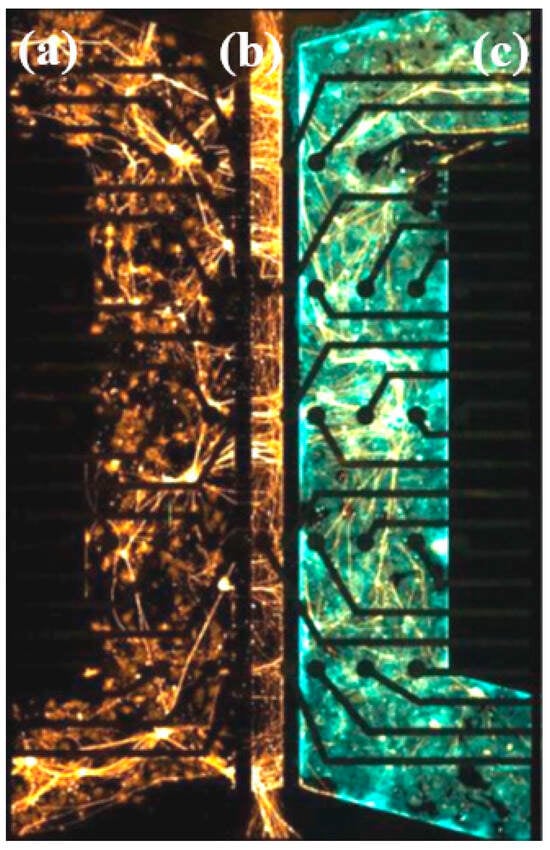
Figure 1.
Organ-on-a-chip coculture illustrative image. The effects of the HO extract on neuronal signaling were evaluated in an organ-on-a-chip model including separate compartments for neuron and keratinocyte cultures, separated by a microchannel compartment enabling the growth of connecting axons but not the migration of whole cells. (a) Neuron compartment; (b) axon microchannels; (c) keratinocyte compartment: activation of OXTR by oxytocin.
The culture chips were coated with 0.1 mg/mL poly-D-lysine (Thermofisher A38904, Waltham, MA, USA), and incubated overnight at 37 °C, then triple-washed with PBS. The chips were then coated with SureBond-XF solution (Axol Bioscience ax0053, Easter Bush, UK) diluted by a factor of 200, and incubated for 4 h at 37 °C. The SureBond-XF solution was removed from the chips prior to cell seeding.
Thawed AxoCells sensory neurons (Axol Bioscience ax0055) were seeded in the neuron compartment at a density of 2000 cells/mm2. On days 1 and 3, the medium was completely replaced with enhanced sensory neuron maintenance medium supplemented with 0.25% 1:200 Surebond-XF; on day 3, 75% of the medium was replaced with enhanced sensory neuron maintenance medium supplemented with 2.5 μg/mL mitomycin C (Sigma M4287, St Louis, MO, USA); on day 6, 75% of the medium was replaced with enhanced sensory neuron maintenance medium supplemented with 0.25% 1:200 Surebond-XF; and on days 9, 13, 16, 20, and 23, 50% of the medium was replaced with enhanced sensory neuron maintenance medium. Enhanced sensory neuron maintenance medium consists of sensory neuron maintenance medium (Axol Bioscience ax0060) + 1% sensory maturation maximizer (Axol Bioscience ax0058) + 25 ng/mL Recombinant human Glial-Derived Neurotrophic Factor (Axol Bioscience ax139855) + 25 ng/mL Recombinant human Nerve Growth Factor (Axol Bioscience ax139789) + 10 ng/mL Recombinant human Brain-Derived Neurotrophic Factor (Axol Bioscience ax139800) + 10 ng/mL Recombinant human Neurotrophin-3 (Axol Bioscience ax139811).
On day 20, keratinocytes (PromoCell C12005, Heidelberg, Germany) were seeded at 25,000 cells/channel. The medium was completely replaced at 24 h, and then three times a week. The medium consisted of keratinocyte growth medium (Promocell C-20011B) supplemented with 2.5% of a keratinocyte supplement mix (Promocell C-39016), and 0.012% 0.5 M calcium chloride (Promocell C-34005).
Incubation was carried out at 37 °C and 5% CO2.
Treatment and measurement of electrical signaling: Treatments were applied on day 21, in four groups of four chips each, each group treated with one of: 10 μM capsaicin; 10 μM oxytocin; 0.1% or 0.2% HO extract. This was performed in parallel with recording the immediate effects of the treatments on electrical signaling, with a Maestro Pro (Axion Biosystems, Atlanta, GA, USA). Following 3 m basal recording, 20 μL of the respective sample vehicle was added via the keratinocyte channel inlet. Electrical activity was recorded for a further 3 min, following which the medium was removed from the keratinocyte channel inlet, and treatments were added in 20-μL volumes to the keratinocyte channel inlet (mimicking exposure through the stratum corneum and viable epidermis in the real-life situation). After a further 55 m incubation, electrical signaling was recorded over 10 min, to provide the data used in the final evaluation of treatment activity.
Recordings were extracted from the AxIS Navigator 3.7.4 software (Axion Biosystems) using the spike count output with a 3 s binning. For each chip, the mean firing rate (MFR) over the first three minutes of the fast-acting recording was used to normalize all data. The activity fold change was obtained by normalizing the MFR over the entire length of the long-term recording.
Effects were assessed using a 1-way ANOVA analysis with Sidak’s post hoc test, following normality and variance homogeneity checks; for non-normal data, a Kurskal Wallis analysis with Dun’s post hoc test was used instead. The outliers were excluded.
Immunofluorescent staining for DAPI (marker of nuclei) and peripherin (axon marker): Once the recording of electrical activity was complete, cell culture media were removed, and cell culture channels were washed with D-PBS. A 4% formaldehyde solution in D-PBS (diluted from Thermofisher 28908) was added, followed by 30 m incubation at room temperature. Channels were then triple-washed with D-PBS. A 0.1% Triton X100 (Sigma Aldrich X100) permeabilization solution was added, followed by 10 min incubation at room temperature and triple-washing with D-PBS. A 1% BSA blocking solution (Thermofisher 14190250) was added, followed by 30 m incubation at room temperature and removal of the blocking solution. A primary antibody solution (Anti-PRPH (Rabbit), diluted 1/50, Abcam ab4666, Cambridge, UK) was added to the neuron compartment, followed by incubation overnight at 4 °C. After triple-washing with D-PBS, a secondary antibody solution (Anti-Rabbit AF647, diluted 1/1000, Abcam ab150075) was added in the dark, followed by 2 h incubation in the dark at room temperature, and triple-washing with D-PBS. Finally, a 3 μM DAPI solution (Sigma D8417) was added, followed by 10 m incubation at room temperature and triple-washing with D-PBS.
Images were acquired with an Axio observer 7 microscope (Zeiss, Oberkochen, Germany). Images were reconstituted with the instrument’s software (Zeiss Zen 3.3.89).
Image analysis:
Image analysis was carried out using Fiji [35] and Cellpose [36,37], implemented in the BIOP Fiji plugin [38].
Neuron nucleus segmentation: Raw DAPI images of the neuron compartment were also corrected for noise using a 2D Gaussian blur filter (1 × 1 kernel value). To reduce the blurring effect observed in the DAPI neuron staining and improve nucleus segmentation, a Fast Fourier Transform (FFT) was applied, including only high-frequency information (corresponding to nucleus staining). An unsharp masking (radius = 15, mask = 0.9) was performed, subtracting a blurred copy of the image and sharpening the DAPI nucleus staining. Automatic nucleus segmentation was carried out using the stardist model [39,40] as implemented in Fiji, and the corresponding output segmentation maps were used to calculate the total number of neurons in the neuron compartment.
Peripherin quantitative analysis: Peripherin staining was measured in the neuron compartment. Raw images were corrected for Gaussian noise using a 2D-Gaussian blur filter (1 × 1 kernel value). A background correction was then performed using a rolling ball algorithm [41], determining local background value by averaging all values in a large ROI around each pixel, and subtracting this average value from the original image. The Tubeness Fiji-plugin [42] was then used to produce a score for how “tube-like” each point in an image is, making it possible to focus specifically on peripherin staining corresponding to neuronal axons. Finally, a kmeans clustering algorithm (k = 4) was applied to delimit these neuronal axons in the neuron compartment. This neuronal axon ROI was used to quantify peripherin density, defined as the ratio between the neuronal axon area and the image area in the neuron compartment.
Statistical analyses were performed using Prism 10.2.3 (GraphPad, Boston, MA, USA), using a one-way ANOVA test with post hoc Dunnett test or Sidak test for parametric tests and Kruskal–Wallis test with post hoc Dunn’s test was used for non-parametric tests. A significance threshold of p < 0.05 was used for all analyses.
2.2.5. Clinical Trial Protocol
This study aimed to demonstrate the ability of the Hyacinthus orientalis bulb extract to deliver OXT-like end benefits in a clinical setting, including reduced nociception, enhanced touch sensorial receptivity, and well-aging improvements to skin beauty indicators.
The study was performed according to the Declaration of Helsinki principles and subsequent amendments, and in the spirit of Good Clinical Practice Guidelines and general principles of Portugal Law 46/2004 of August 19th 2004. The protocol and test conditions were reviewed by an Internal Review Board (Protocol number: PT.06.01, approval date 11/09/2023; RNEC registration number 489243). Study participants gave informed consent in writing.
General design:
This study followed a double-blind, randomized placebo-controlled design, in two groups (active vs. placebo). A formulation containing 1% preserved Hyacinthus orientalis bulb extract was used opposite a placebo, in which the active ingredient was replaced with water and glycerin (to account for glycerin content in the preserved extract) (Table A1, Appendix A).
Products were applied on the face and forearms twice a day for 28 days (one pump each, following training on D0; product quantity used at each application was evaluated as 0.82 ± 0.34 g, for the active product and 0.92 ± 0.48 g, the placebo). To capture immediate, short-term, and longer-term effects, measurements were carried out on Day 0 (D0) and Day 28 (D28), before and immediately (ca. 1 h) after product application, as well as on Day 7 (D7) (without product application).
A total of 64 subjects were recruited (in 2 groups of 32), aged 19 to 65 years (mean age = 45), of both sexes (50% of each); the phototype (Fitzpatrick) range was I to IV, and the ethnic distribution included ca. 67% Caucasian subjects and 33% Brazilian (mixed-African) subjects. Menopausal status was recorded. Three subjects dropped out of the study (two from the active group and one from the placebo group), for personal reasons unrelated to the study.
All evaluations were performed in one of two time periods (9h00–13h00 and 13h00–19h00) to minimize circadian variations, in a climate-controlled room and after at least 15 min acclimatization (T = 21 °C ± 2 °C; RH = 55% ± 10%).
Evaluation of skin tactile receptivity by electroencephalography (EEG; Enobio-32, Neuroelectrics, Barcelona, Spain): An EEG array with a 32-sensor headset was used to assess skin touch sensoriality in response to a gentle touch. A feather was applied to the forearm skin of each subject, before product application and 30 min after product application, while the subject was wearing the EEG helmet. Measurements were taken at D0 and D28, before and after product application; and at D7, without product application. A Power Spectral Decomposition of the EEG signals was performed in the following sequence using the instrument software: Pre-processing of the signal (bandpass filtering and notch filtering (using a zero phase-lag band-pass Butterworth filter); re-referencing; artifact rejection; Fast Fourier Transform (FFT).
Evaluation of skin nociception/sensitivity by capsaicin stinging test: Cotton impregnated with a 3.16 × 10−5% solution of capsaicin (Sigma-Aldrich 1003366230, St Louis, MO, USA) was applied to the nasogenian fold. The stinging sensation was assessed at 2 min, 5 min and 10 min, on a 7-point scale from ‘absent’ to ‘significant’. The final stinging score is the mean of the three assessments. This assessment was made at D0 and at D28, each time before and after product application.
Evaluation of skin nociception/sensitivity by thermal stimulation (Periflux LDPM PF5000 equipped with a 457/PF 5010 heating probe, Perimed, Sweden): The instrument’s probe was used to apply heat at a set temperature (44 °C) to the participants’ face, and the operator recorded the time until the participant reports a sensation of discomfort (in seconds). This assessment was made at D0 and at D28, each time before and after product application.
Clinical evaluation by trained dermatologists: Grading of skin wrinkling was carried out by trained clinicians, based on Bazin’s scale [43]. Clinicians also graded the skin’s healthy glow, according to a five-point scale from Score 0, “Absence of skin glow”, to Score 4, “Very healthy skin glow” (half-points were allowed to increase resolution). Grading was carried out on the whole face, at D0 and D28 (each time, both before and after product application).
Analysis of skin color by ChromaMeter: Skin color was measured using a tristimulus color analyzer measuring reflected color (Chromameter CR-400, Minolta, Tokyo, Japan). The system provides data along the L* (luminance), a* (red–green), and b* (blue–yellow) axes of the Hunter color space.
Evaluation of skin wrinkling by Visia-CR with PRIMOS (Visia-CRP model CR5 with Vectra 7.7.6 software, Canfield, Parsippany, NJ, USA). Standardized photographic images of both hemifaces were obtained before, during, and after treatment (D0, D7, and D28) with normal, cross-polarized, and parallel-polarized lighting (the latter for fringe projection analysis only), in order to quantify the evolution of wrinkles. The integrated PRIMOS system evaluated wrinkles and texture (roughness) through deviation analysis of fringe projection images, expressed in the following indices: wrinkle count; wrinkle volume; wrinkle average depth; Ra = arithmetic mean of the skin surface; Rz = mean of the 5 biggest peaks and the 5 lowest valleys in the image area.
Skin elasticity by Cutometer and clinical grading: Skin biomechanical evaluation was performed using a Cutometer® dual MPA 580 with a 2 mm probe (Courage & Khazaka, Koln, Germany), which measures the elasticity of the upper skin layers using negative pressure (suction), which deforms the skin mechanically. The penetration depth of tissue into the probe (indicating the extent of skin deformation) is determined by an optical measurement system. Elasticity is evaluated as the skin’s ability to return into its original position following deformation.
Statistical analysis was performed using Prism 10.2.3 (GraphPad, Boston, MA, USA), using an unpaired Student’s t-test and a Mann–Whitney test for parametric and non-parametric analyses, respectively. For each parameter, values at each timepoint were compared to values recorded with the same product at D0; changes recorded from D0 to a given timepoint were compared between products. A significance threshold of p < 0.05 was used for all analyses.
3. Results
3.1. In-Vitro Results
3.1.1. OXTR Receptor Activation
In the CHO cell model, the Hyacinthus orientalis bulb extract significantly activated OXTR, as measured at equilibrium (1 h) via IP1 detection. At 0.2% extract in medium, receptor activation was ca. 71% (Figure 2), indicating that the extract is able to effectively activate OXTR signaling.
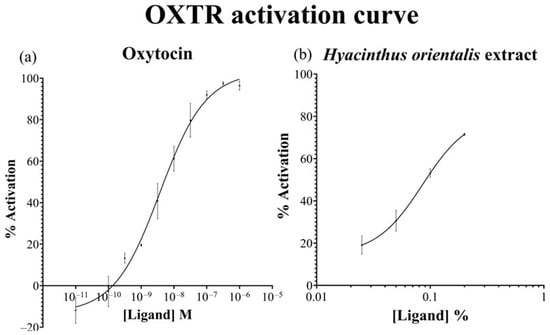
Figure 2.
OXTR receptor activation assay. The activation of the OXTR assay by the HO extract was evaluated against an OXT control in a chimeric model expressing human OXTR in CHO cells. (a) Activation of OXTR by oxytocin; (b) activation by HO extract.
3.1.2. Effect on Dermal Fibroblast Proliferation:
In a culture of normal human dermal fibroblasts, after 24 h of treatment, the TGF-β positive control leg showed a clear increase in cell proliferation, as expected (Figure 3) (+56% vs. untreated control, p = 0.0017). For its part, the HO extract delivered a strong, significant, and dose-dependent enhancement of fibroblast proliferation, exceeding the effect of the TGF-β benchmark (+73% vs. untreated, p < 0.0001 at 0.1%, and +79%, p < 0.0001 at 0.2%). This appears to dovetail with the indication that the HO extract might possess OXT-like biological properties, such as the enhancement of cell proliferation.
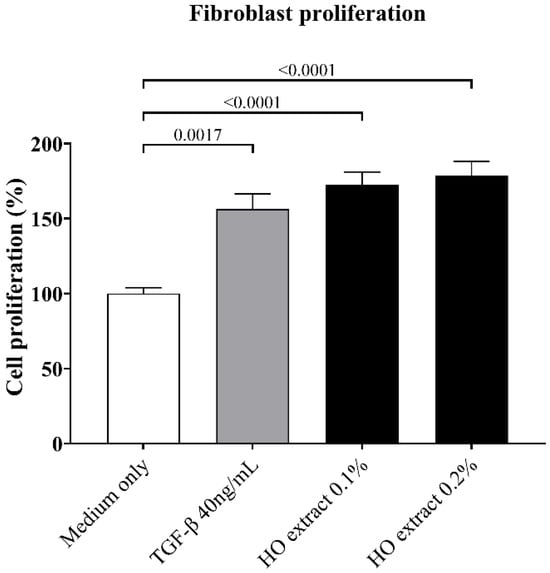
Figure 3.
Enhancement of fibroblast proliferation with Hyacinthus orientalis extract in cell culture. The effect of the HO extract on human dermal fibroblast proliferation was evaluated against a TGF-β positive control and an untreated negative control. HO = Hyacinthus orientalis bulb extract. Numbers above the brackets indicate the statistical p-values for the comparison indicated.
3.1.3. Effect on Inhibition of Nociception in Neuron–Keratinocyte Coculture
In the neuron–keratinocyte coculture model, stimulation with capsaicin significantly increased CGRP release vs. control (+25%, p = 0.00055), as expected, representing a model nociceptive signal (Figure 4). Also as expected, treatment with oxytocin significantly reduced the induced CGRP release, down to levels essentially identical to the unstimulated control (+4% vs. control, p = 0.91). The same effect was observed with capsaicin antagonist capsazepine (+3% vs. control, p = 0.99). Finally, treatment with 0.1% Hyacinthus orientalis bulb extract significantly reduced CGRP release measured following capsaicin stimulation, bringing CGRP levels down below those observed in the unstimulated control as well as with OXT and capsazepine (-8% vs. control, p = 0.56)—suggesting that the extract is able to effectively suppress nociceptive signaling.
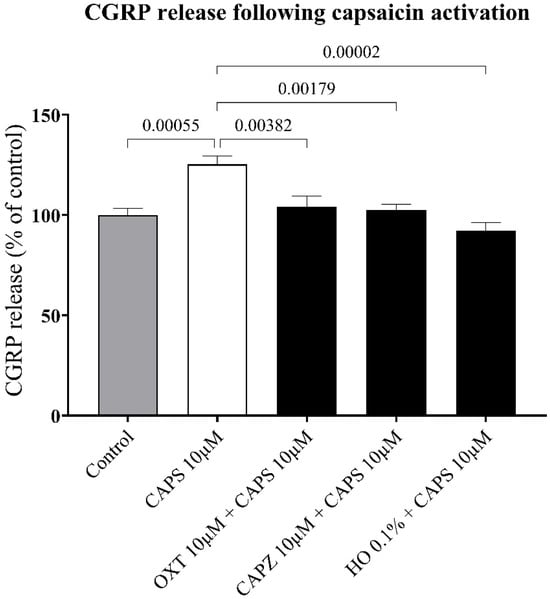
Figure 4.
Reduction in nociceptive signaling with Hyacinthus orientalis extract in a neuron–keratinocyte coculture (CGRP signaling neuropeptide release). The effect of the HO extract on neuronal signaling was evaluated via measurement of CGRP release in a human neuron–keratinocyte coculture stimulated with capsaicin, alongside oxytocin and capsazepine (capsaicin blocker) positive controls; untreated (stimulated and unstimulated) negative controls were also included. CAPS = capsaicin; OXT = oxytocin; CAPZ = capsazepine; HO = Hyacinthus orientalis bulb extract. Numbers above the brackets indicate the statistical p-values for the comparison indicated.
3.1.4. Effect on Electrical Signaling in an Organ-on-a Chip Model
In an organ-on-a-chip model equipped with separate compartments for neurons and keratinocytes, electrical signaling data (Figure 5) showed a slight signaling increase vs. baseline with capsaicin (+19%). Conversely, a decrease was shown with oxytocin treatment (−34% vs. capsaicin, p = 0.0147). Treatment with Hyacinthus orientalis extract decreased signaling activity to similar extents, by 41% at 0.1% (p = 0.0036) and 43% at 0.2% (p = 0.0043) vs. capsaicin treatment).
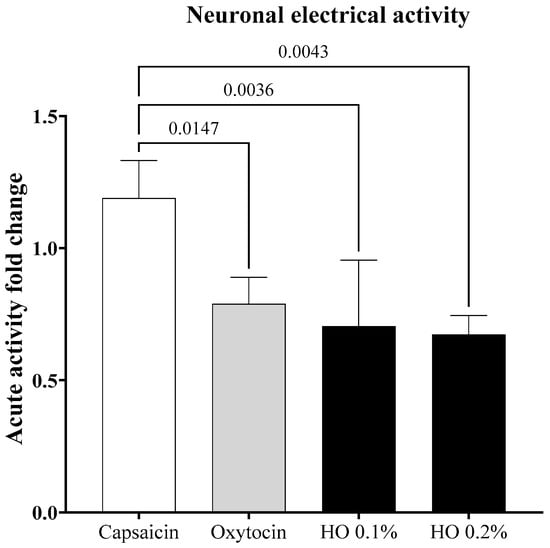
Figure 5.
Effect of treatment with Hyacinthus orientalis bulb extract on electrical signaling in a neuron–keratinocyte multicompartment organ-on-a-chip coculture. The effect of the HO extract on neuronal signaling was evaluated via recording of electrical activity in an organ-on-a-chip coculture comprising separate compartments for neurons and keratinocytes, connected by a microchannel compartment enabling the growth of connecting axons but not the migration of whole cells. Electrical activity was recorded over 10 min following treatment with HO, oxytocin, or capsaicin, respectively (values shown as compared to baseline before stimulation). HO = Hyacinthus orientalis bulb extract. Numbers above the brackets indicate the statistical p-values for the comparison indicated.
3.1.5. Effects on Neuroplasticity
In the neuron–keratinocyte coculture: Staining for neuronal marker β-tubulin in the neuron–keratinocyte coculture described above showed that treatment with 0.1% Hyacinthus orientalis bulb extract resulted in enhanced neuronal survival and dendricity, indicating a possible beneficial effect on innervation.
Neuronal survival: Capsaicin tended to induce a decrease in sensory neuron survival (−24% vs. untreated control, p = 0.5286). Treatment with Hyacinthus orientalis bulb extract at 0.1% tended to increase sensory neuron survival (+23%, p = 0.0914 vs. untreated control; +62%, p = 0.0013 vs. capsaicin challenge) (Figure 6a).
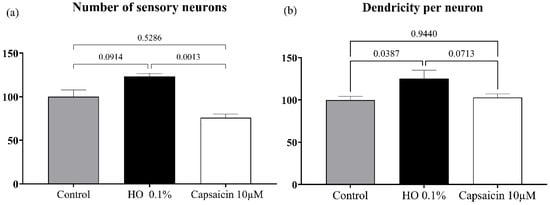
Figure 6.
Neuroplasticity benefits of Hyacinthus orientalis extract in neuron–keratinocyte coculture (β-tubulin staining). The effect of the HO extract on parameters related to neuronal plasticity was evaluated via immunohistochemical staining in a human neuron–keratinocyte coculture stimulated with capsaicin; untreated (capsaicin-stimulated and unstimulated) controls were also included. (a) Number of neurons; (b) neuron dendricity. HO = Hyacinthus orientalis bulb extract. Numbers above the brackets indicate the statistical p-values for the comparison indicated.
Neuron dendricity: Hyacinthus orientalis bulb extract at 0.1% increased sensory neuron dendricity (+25% vs. untreated control, p = 0.0387) (Figure 6b).
In the organ-on-a chip model:
Axonal density: In the second run of the organ-on-a-chip model, image analysis of peripherin staining showed that treatment with Hyacinthus orientalis bulb extract resulted in significantly higher axonal density in the neuronal compartment (Figure 7), in a dose-dependent manner (compared to the capsaicin leg, +133%, p = 0.1776 at 0.1%; +211%, p = 0.0409 at 0.2%); treatment with oxytocin resulted in a slightly weaker increase than treatment with the extract (+107%, p = 0.2787 vs. capsaicin, not statistically different compared to results with the HO extract).
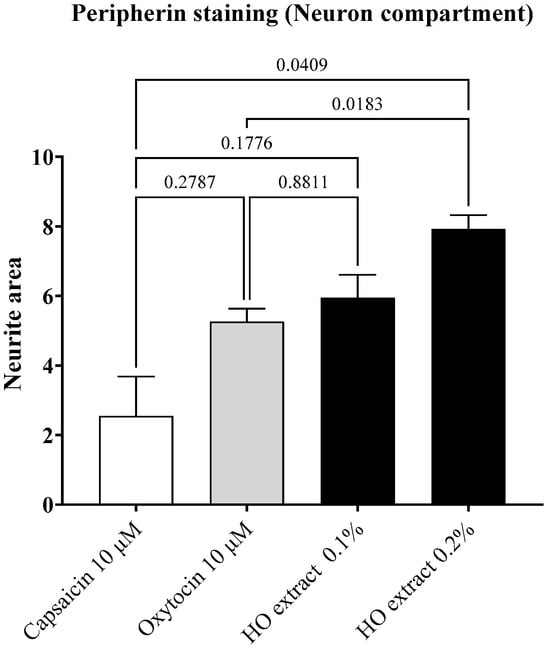
Figure 7.
Neuroplasticity benefits of Hyacinthus orientalis extract in an organ-on-a-chip model. The effect of the HO extract on axonal density was evaluated via immunohistochemical staining in an organ-on-a-chip coculture comprising separate compartments for neurons and keratinocytes, connected by a microchannel compartment enabling the growth of connecting axons but not the migration of whole cells; oxytocin and capsaicin were included as controls. HO = Hyacinthus orientalis bulb extract. Numbers above the brackets indicate the statistical p-values for the comparison indicated.
3.2. Clinical Trial Results
The Hyacinthus orientalis bulb extract was tested at 1% in formulation, in a 28-day double-blind, placebo-controlled clinical trial on two groups of 32 male and female volunteers.
3.2.1. EEG During Feather Touch Stimulation
In EEG recordings made while the subjects’ skin was touched with a feather, selective left-side frontal activation of alpha waves was observed with 1% Hyacinthus orientalis bulb extract in formulation, comparing EEG signal at D0 before product application to that recorded on D0 after product application, on D7, and on D28; the same was not observed with the Placebo product. It was not possible to resolve this effect into numerical forms possessing strong statistical significance, as could be reasonably expected considering the extreme variability associated with this measurement technique; however, electrode AF3 (in the left frontal area) taken in isolation (Figure 8) offers numerical confirmation of the visual trend. This indicates that the extract enhances the skin’s receptivity to gentle touch sensations—and that this effect is both immediate and sustained over longer-term treatment.
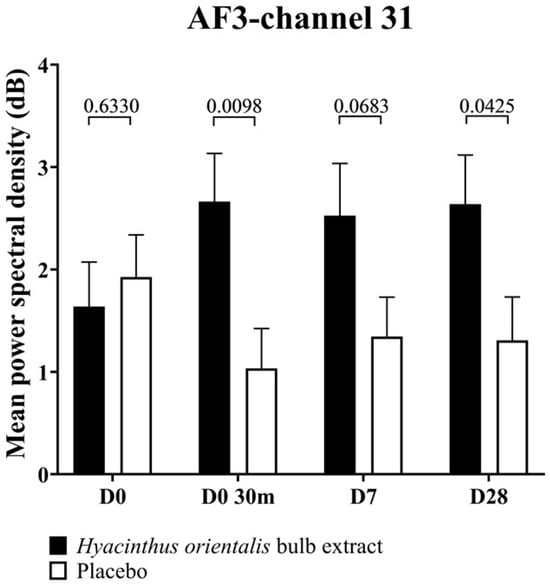
Figure 8.
Enhanced skin touch sensorial receptivity after treatment with 1% Hyacinthus orientalis bulb extract (EEG). The effect of topical treatment with the HO extract on touch sensorial receptivity was evaluated via EEG in a double-blind placebo-controlled randomized clinical trial. Average alpha-wave activation at electrode AF3 (left frontal area) is shown. Numbers above the brackets indicate the statistical p-values for the comparison indicated.
3.2.2. Reduction in Skin Nociception
Capsaicin stinging test: After 28 days, 1% Hyacinthus orientalis bulb extract in formulation shows a significant advantage in reducing capsaicin-induced stinging sensation scores, compared to placebo (−24%, p = 0.00032; −89% vs. D0), as shown in Figure 9a. This demonstrates that treatment with the extract reduces the skin’s nociception sensitivity, confirming the in-vitro indications described above.
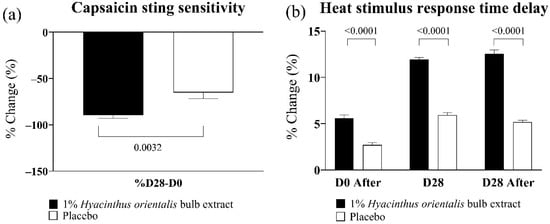
Figure 9.
Reduced skin nociception sensitivity upon treatment with 1% Hyacinthus orientalis bulb extract. The effect of topical treatment with the HO extract on nociceptive sensitivity was evaluated in a double-blind placebo-controlled randomized clinical trial, via a capsaicin sting test and via evaluation of heat stimulus response time. (a) Capsaicin stinging test; (b) heat sensitivity test. Numbers above the brackets indicate the statistical p-values for the comparison indicated.
Heat sensitivity test: After 28 days, 1% Hyacinthus orientalis bulb extract in formulation shows a significant advantage in reducing heat sensitivity, compared to placebo (+6% response time, p < 0.0001; +12% vs. D0) (Figure 9b). A similar, if more modest, benefit is observable after the first product application at D0 (+3% vs. placebo, p < 0.0001; +6% vs. D0 before application). This also confirms that treatment with the extract reduces the skin’s sensitivity to nociception, here as triggered by heat.
3.2.3. Skin Tone and Healthy Glow:
Skin tone (as measured by Chromameter):
After 28 days of treatment with 1% Hyacinthus orientalis bulb extract in formulation, compared to placebo, the Chromameter Hunter color space data show significant improvements in skin tone (Figure 10a), including the following: a significant lightening effect, manifested as an increase in L* values of +2% (p = 0.0064; also +2% vs. D0); a significant reduction in skin redness, expressed as a decrease in a* values of −9% (p = 0.0174; −7% vs. D0), possibly also indicating reduced skin sensitivity; and a significant reduction in skin sallowness, showing as a decrease in b* values of −5% (p = 0.0134; −4% vs. D0).
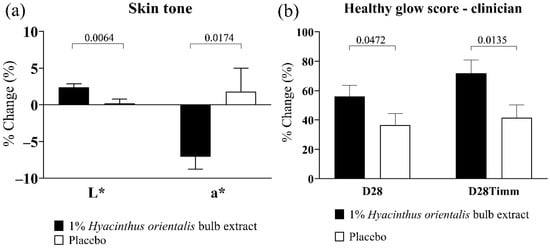
Figure 10.
Improvements of skin tone and healthy glow obtained through treatment with 1% Hyacinthus orientalis bulb extract. The effect of topical treatment with the HO extract on skin tone and healthy glow was evaluated in a double-blind placebo-controlled randomized clinical trial, by chromametry and clinician evaluation, respectively. (a) Chromameter: L* (left), a* (right); (b) improved healthy glow (clinician grading). Numbers above the brackets indicate the statistical p-values for the comparison indicated.
Healthy skin glow as assessed by clinician grading:
As shown in Figure 10b, clinician grading for healthy glow shows strong and significant advantages for 1% Hyacinthus orientalis bulb extract in formulation vs. placebo after 28 days’ treatment, both before and after product application (at D28 before product application, +56% vs. D0 and +19% vs. placebo, p = 0.0472; at D28 after product application, +72% vs. D0 and 30% vs. placebo, p = 0.0135).
3.2.4. Skin Elasticity (Cutometer)
The cutometer evaluation of skin elasticity at D28 shows an advantage for 1% Hyacinthus orientalis bulb extract in formulation, compared to placebo (+13%, p = 0.0275; +17% vs. D0) (Figure 11). Skin firmness data (not shown) showed no significant difference between the two products.
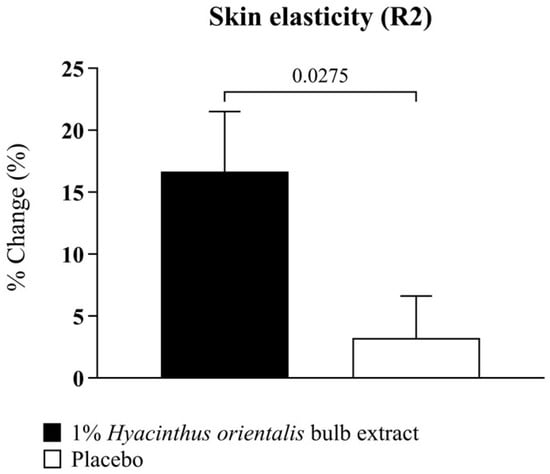
Figure 11.
Improvements in skin elasticity obtained through treatment with 1% Hyacinthus orientalis bulb extract (cutometer). The effect of topical treatment with the HO extract on skin elasticity was evaluated in a double-blind placebo-controlled randomized clinical trial, using a cutometer (R2 parameter results are shown). Numbers above the bracket indicate the statistical p-values for the comparison indicated.
3.2.5. Skin Wrinkling and Roughness
Instrumental evaluation (Visia + PRIMOS):
Image analysis using Visia-CR shows an advantage in skin wrinkle counts for 1% Hyacinthus orientalis bulb extract in formulation over placebo at D28 of −18% (p = 0.0212; −11% vs. D0) (Figure 12a). The inbuilt PRIMOS tool also shows advantages for 1% Hyacinthus orientalis bulb in formulation over placebo in skin roughness indices: −4% Ra (p = 0.0355, −4% vs. D0) and −5% Rz (p = 0.0234, −4% vs. D0) at D28 (Figure 12b,c). At D7, the same general trends are discernible, but do not achieve statistical significance.
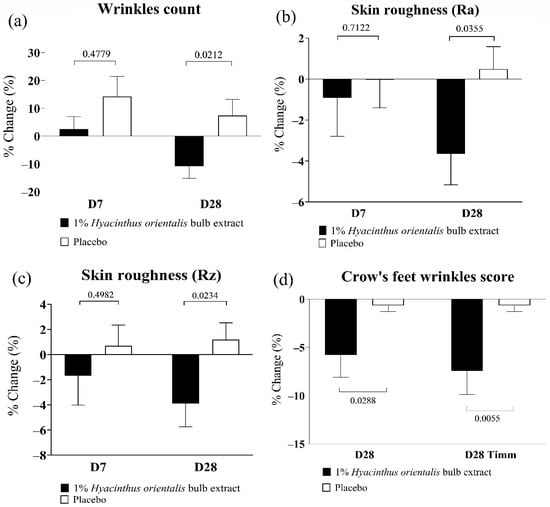
Figure 12.
Anti-wrinkle effects of treatment with 1% Hyacinthus orientalis bulb extract. The effect of topical treatment with the HO extract on skin wrinkling and texture was evaluated by Visia-PRIMOS image analysis and clinician grading, in a double-blind placebo-controlled randomized clinical trial. (a) Wrinkle counts (Visia); (b,c) skin roughness indices Ra and Rz (PRIMOS); (d) Bazin crow’s feet wrinkle scores (clinical evaluation). Numbers above the brackets indicate the statistical p-values for the comparison indicated.
Clinical evaluation of skin wrinkling:
Clinician grading of skin wrinkling at the corner of the eye, using the Bazin scale, shows an advantage of −5% (p = 0.0288; −6% v. D0) in wrinkle grading for 1% Hyacinthus orientalis bulb extract in formulation vs. placebo at D28 compared to D0 (Figure 12d). This result bears out the instrumental data (above).
Figure 13 shows images illustrating these results.
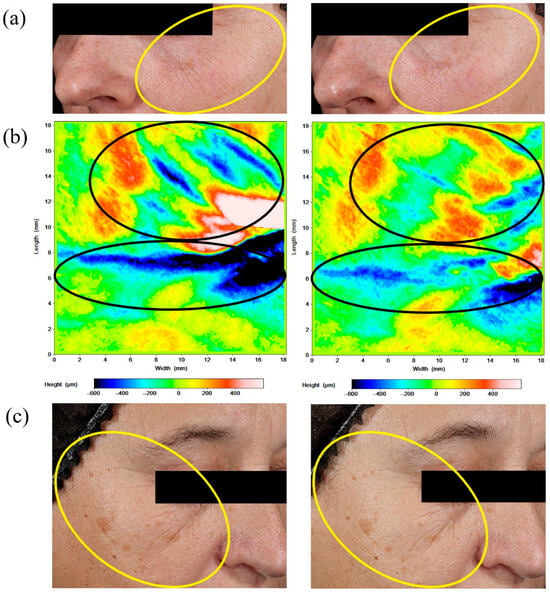
Figure 13.
Illustrative images. The effect of topical treatment with the HO extract on skin wrinkling and texture was evaluated by Visia-PRIMOS image analysis, in a double-blind placebo-controlled randomized clinical trial; illustrative images of the effect of the active product are shown. (a) Visia cross-polarized visible images showing effect on skin wrinkling, Volunteer #04, −34.3% wrinkle count and −25% Bazin score at D28 (right) vs. D0 (left); (b) PRIMOS false-color relief map images, Volunteer #12, −46% wrinkle count and −25% Bazin score at D28 (right) vs. D0 (left); (c) Visia cross-polarized visible images showing effect on skin radiance, Volunteer #11, +4% L*, +67% glow clinical grade, and +25% glow (self-grading), at D28 (right) vs. D0 (left). Circles show main regions of interest.
4. Discussion
The work described above shows that this aqueous extract of Hyacinthus orientalis bulbs, containing iminosugars with known antioxidant, anti-inflammatory, and neuroprotective activities, can significantly activate OXTR in a chimeric cell model. The same extract also showed a strong pro-proliferative effect in a culture of normal human dermal fibroblasts. Studies in a single-compartment neuron–keratinocyte coculture model showed that the HO extract (with pretreatment and simultaneous exposure) reduced nociceptive signaling induced by oxytocin, as measured via CGRP release. The same model also demonstrated pro-innervation benefits of the extract (neuron survival under capsaicin challenge, neuronal dendricity as revealed by analysis of β-tubulin staining images). These observations were further strengthened by studies in an organ-on-a-chip coculture, where neurons and keratinocytes were housed in separate compartments communicating through microchannels allowing the growth of neurites connecting the two types of cells. In this model, lower electrical signaling was recorded with oxytocin and the HO extract, compared to capsaicin; analysis of peripherin staining images also indicated possibly incipient neurite growth, strengthening the neuroplasticity indication.
Finally, these twin indications were confirmed in a two-group, double-blind, placebo-controlled trial, where topical treatment with 1% HO extract in formulation led to significantly reduced nociception, whether triggered by capsaicin or by heat, compared to placebo; and where the group treated for 28 days with the extract evinced noticeably higher receptivity to gentle, pleasant tactile stimulation (represented by a feather touch), as evaluated by increased left frontal alpha wave activation (in EEG recordings). In the literature, this kind of alpha wave activation is associated with positive affect and wellbeing, and indicates a positive emotional state advantage for the active group. For example, Davidson et al. reported measuring a correlation between left frontal activation and self-reported wellbeing; interestingly, this held true for both hedonistic and eudaimonic wellbeing [44]. The Davidson group also reported a correlation between greater left hemisphere anterior activation and preference for word pairs conveying more pleasant affective tones [45], as well as a correlation between greater left-side frontal anterior EEG activation and a lower sensitivity to acoustic startle probes following visual negative emotional stimuli [46]. Conversely, Larra et al. found a correlation between right-side frontal activation and a discomfortable tactile stimulus (a cold pressor test, applied to the feet) [47]. For their part, Lewis et al. found that examination stress tended to shift EEG frontal asymmetry towards the right hemisphere, and even that this correlated with reported negative health outcomes [48]. And further, follow-on research in a similar stress setting by the Papousek group found that, while participants with lower trait positive affect indeed showed right hemisphere activation, participants with higher trait positive affect were less affected, and sustained higher left hemisphere activation—an effect the authors associated with differential activation of approach/avoidance motivation mechanisms [49]. Quaedflieg et al. further associated such frontal asymmetry with neuroendocrine responses [50]. While these precedents may be seen as highlighting biological predispositions to certain modes of emotional regulation, the association they suggest between left frontal EEG activity and positive affect can nevertheless be seen as suggestive—so that here, the results recorded in the clinical study may possibly be interpreted as indicating a pleasant or pleasurable sensation during the feather touch, seemingly more pronounced with the active product than the placebo. This would indicate that the extract exerts both short-term and long-term effects, and may promote positive affect and wellbeing sensations in the user via the enhancement of pleasurable skin touch perception.
The same clinical trial also revealed further benefits of topical treatment with the HO extract, including the following: improvements in skin tone (evaluated by chromameter) and healthy glow (by clinical grading); skin elasticity (measured by cutometer); and significantly reduced wrinkling (in the crow’s feet area, as evaluated by clinical grading and image analysis).
Since reduced nociception and neuroplasticity are well-described biological effects of oxytocin, and since a positive correlation between apparent skin aging and oxytocin level has been reported, the present observations seem consistent with downstream benefits which may be expected to result from the activation of OXTR signaling, such as this HO extract was shown to be capable of. It is therefore at least possible that this is the pathway through which these effects of the HO extract proceed. Certainly, the results reported here appear consistent with the inverse correlation between oxytocin levels and apparent skin aging reported by Hayre [27] based on measurements of oxytocin levels in urine and assessment of facial photography in six female participants aged 48–61. In fact, given the arguable advantages of the clinical trial described here, compared to the study reported by Hayre (including a significantly larger group size and the greater diversity of parameters measured), it can be argued that these new results considerably strengthen the link originally suggested by Hayre.
Interestingly, we did not observe any pro-pigmentation effects, as might have been expected based on the pro-melanogenesis effects of OXT reported by Alanazi et al. [21]—this does indicate a possible point of differentiation between OXT and the HO extract. Perhaps this indicates that OXTR is differently involved in the pro-pigmentation effect than in other effects of OXT.
It should be acknowledged here that some of these results, as presented above, may at first blush appear counter-intuitive, indicating as they do both reduced nociception and enhanced innervation and receptivity to gentle touch stimulation: indeed, one may initially expect that reduced (or increased) sensitivity would apply to both types of sensation, and not that the participants would become less sensitive to the one but at the same time more sensitive to the other. However, both effects are wholly consistent with the reported biological effects of oxytocin, as discussed above [17,18,19,20,21,22,23]. As it were, not all signaling is created equal; nociceptive signals and touch sensing signals, while employing some common nervous infrastructure, remain sufficiently differentiated from one another, and proceed through sufficiently different pathways [51,52,53,54], allowing oxytocin (and similarly, the HO extract employed in this work) to affect them simultaneously, but differentially. In fact, the apparently counter-intuitive character of these results may be considered as one more element of close similarity between the effects of this HO extract and those of oxytocin, thereby reinforcing the indication that the extract’s effects proceed through activation of oxytocin signaling.
The studies reported above do possess certain undeniable limitations. For example, while these various observations are consistent with the effects expected to result from the activation of oxytocin signaling, they do not yet prove unambiguously that these effects, or all of these effects, proceed through oxytocin signaling, at least in the case of this extract—or, at least, not exclusively through oxytocin signaling. It is conceivable that other biological properties of some of the plant’s components (e.g., anti-inflammatory or antioxidant phytochemical compounds) also play a role in delivering some of the benefits observed, in particular in the clinical setting. Also, due to limited resources, the organ-on-a-chip multicompartment coculture protocol was conducted in the absence of an untreated, unchallenged negative reference leg, and included neither pretreatment with the HO extract nor capsaicin stimulation concomitant with treatment with the HO extract—precluding some valuable comparisons and leaving some interesting questions unanswered. In addition, it only examined immediate effects; considering that pro-innervation effects can be expected to require significantly more time to make themselves fully manifest (e.g., in axon growth), this represents an additional limitation on the model. Regarding the clinical trial, in spite of the powerful indications observed, the high variability in the EEG data remains a main drawback, which this study design did not fully overcome.
Further studies could seek to address some of the limitations called out above and further fill in the picture suggested by the present work, as well as confirm those results of the present work for which this would be useful. For example, inclusion of an OXTR antagonist in future studies might further confirm the involvement of the OXTR pathway in the effects observed here. Next, further analysis and fractionation of the HO extract, combined with further OXTR activation assays, could be useful in isolating the particular compound, or combination of compounds, responsible for the effects reported here. Having isolated such substances, it might also be interesting to establish whether the same substances, absent the rest of the extract’s components, also possess the rest of the downstream benefits demonstrated in the present work, such as reducing nociception or enhancing skin tactile receptivity. This would, inter alia, help elucidate whether the activation of OXTR and OXT signaling represent the main, or single, mechanism through which these downstream effects proceed; and if not, this data may illuminate what other pathways and components may be involved. The effect of the HO extract or component fractions thereof on other signaling pathways (e.g., TRPV1, serotonin, GABA) might be explored, to further elucidate the complete signaling mechanisms behind the effects reported here—especially in light of the research reviewed by Gonzalez-Hernandez and Charlet [24]. Perhaps an optimization of these effects through fine-tuning a particular fraction’s composition might naturally follow. More narrowly relating to the work reported here, a revisited design might be considered for the organ-on-a-chip coculture work, by adopting the best elements of the simple coculture experiment: comparing an untreated reference with legs (pre)treated with the extract, in both cases with and without capsaicin stimulation. Significantly longer treatment times should be attempted, in an effort to confirm and fill out the pro-innervation indications suggested in the present results. Finally, it would also most probably be useful to refine the clinical trial, perhaps using a different EEG instrument and protocol to focus more tightly on frontal alpha-wave activity—or perhaps, to replace EEG entirely with another technique, such as fMRI; a significantly larger group size might also be recommended, to try and overcome the inherent high variability of this type of data, and controlling for handedness in the subjects. It may also be interesting to explore the response of treated skin to different types (i.e., using different objects and textures), as well as intensities (e.g., levels of applied pressure), of touch stimulation. There may be valuable insights in the effects of activated OXTR signaling on the perception of differently textured tactile stimulus, including any effect on the limitations of the pleasant character of such sensation. Conversely, perhaps additional, different types of nociception trigger may also be attempted to expand the scope of investigation regarding this end of the sensation spectrum. Similarly, it may be argued that verifying these effects in different skin types could reveal further interesting nuances. This could include different ethnicities and body sites, but also different skin conditions (e.g., oily skin, dry skin, and the like—but also perhaps mildly compromised skin, such as irritated or sunburned skin). Finally, while—to the best of our knowledge—other than HO extract, no cosmetic ingredients shown to activate the OXTR receptor are available on the market, there do exist ingredients claiming to increase the levels of oxytocin in the skin [55,56,57]; and some phytochemical compounds have been reported to activate the OXTR [58]. It might be interesting to compare their potency to that of the HO extract, in some or all of the models described here.
5. Conclusions
The work reported above shows that the Hyacinthus orientalis bulb (HO) extract used activates the oxytocin receptor (as demonstrated in vitro in a chimeric cell model). In-vitro (coculture) studies demonstrated that exposure of cell cultures to the HO extract has oxytocin-like effects consistent with the activation of oxytocin signaling, including the enhancement of cell (dermal fibroblast) proliferation, the reduction in nociception signaling, and the promotion of innervation and neuron survival indicators. Finally, a placebo-controlled clinical trial also confirmed that topical treatment with the same HO extract in formulation yielded indications consistent with the activation of oxytocin signaling, in particular the reduction in nociception signaling and the concomitant enhancement of skin receptivity to pleasant gentle tactile sensation. The same trial also showed that treatment with the HO extract enhanced skin health and beauty indicators, dovetailing with reported correlations of apparent skin aging with oxytocin levels.
Taken together, the results presented here indicate that this aqueous extract of Hyacinthus orientalis bulbs is capable of meaningful activation of oxytocin signaling, thereby locally delivering several of the known beauty and wellbeing benefits of said activation. Further, they indicate that this same extract likely possesses significant potential value for use in topical cosmetic and associated applications aimed at holistically enhancing skin health and beauty, as well as the tactile sensation experience of the user.
Author Contributions
Conceptualization, F.H., S.K., and J.A.-V.; methodology, F.H. and J.A.-V.; formal analysis, M.C. and F.H.; investigation, F.H., M.C., and J.A.-V.; resources, J.A.-V.; data curation, M.C. and F.H.; writing—original draft preparation, F.H.; writing—review and editing, F.H., J.A.-V., and S.K.; supervision, J.A.-V.; project administration, F.H. All authors have read and agreed to the published version of the manuscript.
Funding
The authors declare that this study received funding from the Lucas Meyer Cosmetics company. The funder was not involved in the study design, collection, analysis, interpretation of data, the writing of this article or the decision to submit it for publication.
Institutional Review Board Statement
The human study reported above was conducted in accordance with the guidelines of the Declaration of Helsinki, and the protocol was approved by the Ethics Committee of Clinica Dr. Carlos Ramos of Portugal (Protocol number: PT.06.01, approval date 9 November 2023; RNEC registration number 489243).
Informed Consent Statement
Informed consent was obtained from all subjects involved in the study.
Data Availability Statement
The data presented in this study are available on request from the corresponding author.
Conflicts of Interest
The authors are employees of Lucas Meyer Cosmetics and its affiliates, and declare no conflict of interest. Beyond funding our work, the company as such had no role in the design of the study; in the collection, analyses, or interpretation of data; in the writing or editing of the manuscript; or in the decision to publish the results.
Appendix A
Table A1 presents the formulations employed in the clinical trial.

Table A1.
Clinical trial formulations.
Table A1.
Clinical trial formulations.
| INCI/Chemical Name | % In Formula—Active | % In Formula—Placebo |
|---|---|---|
| Water | 84.35 | 84.85 |
| Butylene glycol | 4.00 | 4.00 |
| Dipropylene glycol | 1.00 | 1.00 |
| Hexylene glycol | 1.00 | 1.00 |
| Polysorbate 20 | 1.00 | 1.00 |
| Hydrogenated polydecene | 1.50 | 1.50 |
| Cyclomethicone | 4.00 | 4.00 |
| Hyacinthus orientalis bulb extract | 1.00 | 0.00 |
| Glycerol | 0.00 | 0.50 |
| Carbomer | 0.80 | 0.80 |
| Triethanolamine | 0.70 | 0.70 |
| Phenoxyethanol | 0.40 | 0.40 |
| Methyl paraben | 0.15 | 0.15 |
| EDTA | 0.10 | 0.10 |
| TOTAL | 100.00 | 100.00 |
References
- Audunsdottir, K.; Quintana, D.S. Oxytocin’s dynamic role across the lifespan. Aging Brain 2022, 2, 100028. [Google Scholar] [CrossRef]
- Leng, G.; Leng, R.I. Oxytocin: A citation network analysis of 10 000 papers. J. Neuroendocrinol. 2021, 33, e13014. [Google Scholar] [CrossRef]
- Carter, C.S.; Kenkel, W.M.; MacLean, E.L.; Wilson, S.R.; Perkeybile, A.M.; Yee, J.R.; Ferris, C.F.; Nazarloo, H.P.; Porges, S.W.; Davis, J.M.; et al. Is Oxytocin “Nature’s Medicine”? Pharmacol. Rev. 2020, 72, 829–861. [Google Scholar] [CrossRef]
- IsHak, W.W.; Kahloon, M.; Fakhry, H. Oxytocin role in enhancing well-being: A literature review. J. Aff. Disord. 2011, 130, 1–9. [Google Scholar] [CrossRef] [PubMed]
- Assad Nafis, I.; Pandey, A.K.; Sharma, L.M. Oxytocin, Functions, Uses and Abuses: A Brief Review. Theriogenol. Insight 2016, 6, 1–17. [Google Scholar] [CrossRef]
- Gimpl, G.; Fahrenholz, F. The Oxytocin Receptor System: Structure, Function, and Regulation. Phys. Rev. 2001, 81, 629–683. [Google Scholar] [CrossRef] [PubMed]
- Bussolati, G.; Cassoni, P. Editorial: The Oxytocin/Oxytocin Receptor System—Expect the Unexpected. Endocrinology 2001, 142, 1377–1379. [Google Scholar] [CrossRef][Green Version]
- Zingg, H.H.; Laporte, S.A. The oxytocin receptor. Trends Endocrinol. Metabol. 2003, 14, 222–227. [Google Scholar] [CrossRef]
- Deing, V.; Roggenkamp, D.; Kühnl, J.; Gruschka, A.; Stäb, F.; Wenck, H.; Bürkle, A.; Neufang, G. Oxytocin modulates proliferation and stress responses of human skin cells: Implications for atopic dermatitis. Exp. Dermatol. 2013, 22, 399–405. [Google Scholar] [CrossRef]
- Denda, S.; Takei, K.; Kumamoto, J.; Goto, M.; Tsutsumi, M.; Denda, M. Oxytocin is expressed in epidermal keratinocytes and released upon stimulation with adenosine 5′-[γ-thio] triphosphate in vitro. Exp. Dermatol. 2012, 21, 535–537. [Google Scholar] [CrossRef]
- Denda, M.; Nakanishi, S. Do epidermal keratinocytes have sensory and information processing systems? Exp. Dermatol. 2022, 31, 459–474. [Google Scholar] [CrossRef]
- Fujimoto, K.; Inada, K.; Oka, K.; Ito, E. Revisiting oxytocin generation in keratinocytes. Biophys. Physicobiol. 2023, 20, e200003. [Google Scholar] [CrossRef]
- Zagoory-Sharon, O.; Levine, A.; Feldman, R. Human sweat contains oxytocin. Psychoneuroendocrinology 2023, 158, 106407. [Google Scholar] [CrossRef]
- Ellingsen, D.M.; Leknes, S.; Løseth, G.; Wessberg, J.; Olausson, H. The neurobiology shaping affective touch: Expectation, motivation, and meaning in the multisensory context. Front. Psychol. 2016, 6, 1986. [Google Scholar] [CrossRef] [PubMed]
- Alanazi, M.M.; Havranek, T.; Bakos, J.; Cubeddu, L.X.; Castejon, A.M. Cell proliferation and anti-oxidant effects of oxytocin and oxytocin receptors: Role of extracellular signal-regulating kinase in astrocyte-like cells. Endocr. Regul. 2020, 54, 172–182. [Google Scholar] [CrossRef] [PubMed]
- Elabd, C.; Cousin, W.; Upadhyayula, P.; Chen, R.Y.; Chooljian, M.S.; Li, J.; Kung, S.; Jiang, K.P.; Conboy, I.M. Oxytocin is an age-specific circulating hormone that is necessary for muscle maintenance and regeneration. Nat. Commun. 2014, 5, 4082. [Google Scholar] [CrossRef] [PubMed]
- Pekarek, B.T.; Hunt, P.J.; Arenkiel, B.R. Oxytocin and Sensory Network Plasticity. Front. Neurosci. 2020, 14, 30. [Google Scholar] [CrossRef]
- Jafarzadeh, N.; Javeri, A.; Khaleghi, M.; Taha, M.F. Oxytocin improves proliferation and neural differentiation of adipose tissue-derived stem cells. Neurosci. Lett. 2014, 564, 105–110. [Google Scholar] [CrossRef]
- Bakos, J.; Srancikova, A.; Havranek, T.; Bacova, Z. Molecular Mechanisms of Oxytocin Signaling at the Synaptic Connection. Neural Plast. 2018, 2018, 4864107. [Google Scholar] [CrossRef]
- Salehi, M.S.; Neumann, I.D.; Jurek, B.; Pandamooz, S. Co-Stimulation of Oxytocin and Arginine-Vasopressin Receptors Affect Hypothalamic Neurospheroid Size. Int. J. Mol. Sci. 2021, 22, 8464. [Google Scholar] [CrossRef]
- Alanazi, M.M.; Alsanea, S.; Kumar, A.; Alehaideb, Z.; Matou-Nasri, S.; AlGhamdi, K.M. Modulatory effects of oxytocin on normal human cultured melanocyte proliferation, migration, and melanogenesis. Tissue Cell 2024, 91, 102579. [Google Scholar] [CrossRef]
- González-Hernández, A.; Manzano-García, A.; Martínez-Lorenzana, G.; Tello-García, I.A.; Carranza, M.; Arámburo, C.; Condés-Lara, M. Peripheral oxytocin receptors inhibit the nociceptive input signal to spinal dorsal horn wide-dynamic-range neurons. Pain 2017, 158, 2117–2128. [Google Scholar] [CrossRef]
- Grinevich, V.; Charlet, A. Oxytocin: Pain relief in skin. Pain 2017, 158, 2061–2063. [Google Scholar] [CrossRef] [PubMed]
- Gonzalez-Hernandez, A.; Charlet, A. Oxytocin, GABA, and TRPV1, the analgesic triad? Front. Mol. Neurosci. 2018, 11, 398. [Google Scholar] [CrossRef] [PubMed]
- Denda, M.; Elias, P.M. Review of sensory systems deployed by epidermal keratinocytes. Front. Cell Dev. Biol. 2025, 13, 1598326. [Google Scholar] [CrossRef] [PubMed]
- Cho, S.-Y.; Kim, A.Y.; Kim, J.; Choi, D.-H.; Son, E.D.; Shin, D.W. Oxytocin alleviates cellular senescence through oxytocin receptor-mediated extracellular signal-regulated kinase/Nrf2 signalling. Br. J. Dermatol. 2019, 181, 1216–1225. [Google Scholar] [CrossRef]
- Hayre, N. Oxytocin Levels Inversely Correlate with Skin Age Score and Solar Damage. J. Drugs Dermatol. 2020, 19, 1146–1148. [Google Scholar] [CrossRef]
- Kayıran, S.; Özkan, D.; Eroğlu, E. The ethnobotanical uses of Hyacinthaceae species growing in Turkey and a review of pharmacological activities. Indian J. Tradit. Knowl. 2017, 16, 243–250. [Google Scholar]
- Karaman, S.; Kocabas, Y.Z. Traditional medicinal plants of K. Maras (Turkey). Sciences 2001, 1, 125–128. [Google Scholar]
- Asano, N.; Kato, A.; Miyauchi, M.; Kizu, H.; Kameda, Y.; Watson, A.A.; Nash, R.J.; Fleet, G.W. Nitrogen-containing furanose and pyranose analogues from Hyacinthus orientalis. J. Nat. Prod. 1998, 61, 625–628. [Google Scholar] [CrossRef]
- Wang, N.; Zhu, F.; Chen, K. 1-Deoxynojirimycin: Sources, Extraction, Analysis and Biological Functions. Nat. Prod. Commun. 2017, 12, 1934578X1701200934. [Google Scholar] [CrossRef]
- Piao, X.; Li, S.; Sui, X.; Guo, L.; Liu, X.; Li, H.; Gao, L.; Cai, S.; Li, Y.; Wang, T.; et al. 1-Deoxynojirimycin (DNJ) Ameliorates Indomethacin-Induced Gastric Ulcer in Mice by Affecting NF-kappaB Signaling Pathway. Front. Pharmacol. 2018, 9, 372. [Google Scholar] [CrossRef] [PubMed]
- Chen, W.; Liang, T.; Zuo, W.; Wu, X.; Shen, Z.; Wang, F.; Li, C.; Zheng, Y.; Peng, G. Neuroprotective effect of 1-Deoxynojirimycin on cognitive impairment, β-amyloid deposition, and neuroinflammation in the SAMP8 mice. Biomed. Pharmacother. 2018, 106, 92–97. [Google Scholar] [CrossRef] [PubMed]
- Stauß, A.C.; Fuchs, C.; Jansen, P.; Repert, S.; Alcock, K.; Ludewig, S.; Rozhon, W. The Ninhydrin Reaction Revisited: Optimisation and Application for Quantification of Free Amino Acids. Molecules 2024, 29, 3262. [Google Scholar] [CrossRef]
- Schindelin, J.; Arganda-Carreras, I.; Frise, E.; Kaynig, V.; Longair, M.; Pietzsch, T.; Preibisch, S.; Rueden, C.; Saalfeld, S.; Schmid, B.; et al. Fiji: An open-source platform for biological-image analysis. Nat. Methods 2012, 9, 676–682. [Google Scholar] [CrossRef]
- Stringer, C.; Wang, T.; Michaelos, M.; Pachitariu, M. Cellpose: A generalist algorithm for cellular segmentation. Nat. Methods 2021, 18, 100–106. [Google Scholar] [CrossRef]
- Pachitariu, M.; Stringer, C. Cellpose 2.0: How to train your own model. Nat. Methods 2022, 19, 1634–1641. [Google Scholar] [CrossRef]
- Cellpose Wrapper for Fiji. Available online: https://github.com/BIOP/ijl-utilities-wrappers (accessed on 29 July 2024).
- Schmidt, U.; Weigert, M.; Broaddus, C.; Myers, G. Cell detection with star-convex polygons. In Proceedings of the Medical Image Computing and Computer Assisted Intervention—MICCAI 2018: 21st International Conference, Granada, Spain, 16–20 September 2018; Part II. pp. 265–273. [Google Scholar]
- Weigert, M.; Schmidt, U. Nuclei instance segmentation and classification in histopathology images with stardist. In Proceedings of the 2022 IEEE International Symposium on Biomedical Imaging Challenges (ISBIC), Kolkata, India, 28–31 March 2022; pp. 1–4. [Google Scholar]
- Sternberg, S.R. Biomedical image processing. Computer 1983, 16, 22–34. [Google Scholar] [CrossRef]
- Sato, Y.; Nakajima, S.; Shiraga, N.; Atsumi, H.; Yoshida, S.; Koller, T.; Gerig, G.; Kikinis, R. Three-dimensional multi-scale line filter for segmentation and visualization of curvilinear structures in medical images. Med. Image Anal. 1998, 2, 143–168. [Google Scholar] [CrossRef]
- Bazin, R.; Doublet, E. Photograding scales. In Skin Aging Atlas; Doublet, E., Ed.; Med’com: Paris, France, 2007; pp. 40–41+50–51. [Google Scholar]
- Urry, H.L.; Nitschke, J.B.; Dolski, I.; Jackson, D.C.; Dalton, K.M.; Mueller, C.J.; Rosenkranz, M.A.; Ryff, C.D.; Singer, B.H.; Davidson, R.J. Making a Life Worth Living: Neural Correlates of Well-Being. Psychol. Sci. 2004, 15, 367–372. [Google Scholar] [CrossRef]
- Sutton, S.K.; Davidson, R.J. Prefrontal brain electrical asymmetry predicts the evaluation of affective stimuli. Neuropsychologia 2000, 38, 1723–1733. [Google Scholar] [CrossRef]
- Jackson, D.C.; Mueller, C.J.; Dolski, I.; Dalton, K.M.; Nitschke, J.B.; Urry, H.L.; Rosenkranz, M.A.; Ryff, C.D.; Singer, B.H.; Davidson, R.J. Now you feel it, now you don’t: Frontal brain electrical asymmetry and individual differences in emotion regulation. Psychol. Sci. 2003, 14, 612–617. [Google Scholar] [CrossRef] [PubMed]
- Zhang, X.; Bachmann, P.; Schilling, T.M.; Naumann, E.; Schächinger, H.; Larra, M.F. Emotional stress regulation: The role of relative frontal alpha asymmetry in shaping the stress response. Biol. Psychol. 2018, 138, 231–239. [Google Scholar] [CrossRef] [PubMed]
- Lewis, R.S.; Weekes, N.Y.; Wang, T.H. The effect of a naturalistic stressor on frontal EEG asymmetry, stress, and health. Biol. Psychol. 2007, 75, 239–247. [Google Scholar] [CrossRef] [PubMed]
- Papousek, I.; Wimmer, S.; Lackner, H.K.; Schulter, G.; Perchtold, C.M.; Paechter, M. Trait positive affect and students’ prefrontal EEG alpha asymmetry responses during a simulated exam situation. Biol. Psychol. 2019, 148, 107762. [Google Scholar] [CrossRef]
- Quaedflieg, C.W.E.M.; Meyer, T.; Smulders, F.T.Y.; Smeets, T. The functional role of individual-alpha based frontal asymmetry in stress responding. Biol. Psychol. 2015, 104, 75–81. [Google Scholar] [CrossRef]
- Caterina, M.J.; Schumacher, M.A.; Tominaga, M.; Rosen, T.A.; Levine, J.D.; Julius, D. The capsaicin receptor: A heat-activated ion channel in the pain pathway. Nature 1997, 389, 816–824. [Google Scholar] [CrossRef]
- Frias, B.; Merighi, A. Capsaicin, Nociception and Pain. Molecules 2016, 21, 797. [Google Scholar] [CrossRef]
- Zimmerman, A.; Bai, L.; Ginty, D.D. The gentle touch receptors of mammalian skin. Science 2014, 346, 950–954. [Google Scholar] [CrossRef]
- Chakrabarti, S.; Klich, J.D.; Khallaf, M.A.; Hulme, A.J.; Sánchez-Carranza, O.; Baran, Z.M.; Rossi, A.; Huang, A.T.; Pohl, T.; Fleischer, R.; et al. Touch sensation requires the mechanically gated ion channel ELKIN1. Science 2024, 383, 992–998. [Google Scholar] [CrossRef]
- Prunizen™—The Feel-Good Anti-Hair Loss. Available online: https://www.clariant.com/en/Business-Units/Care-Chemicals/Personal-Care/Actives-and-Natural-Origins/Active-Ingredients/Natural-Actives/Prunizen (accessed on 31 July 2025).
- Kannabia Sense™|Vytrus Biotech. Available online: https://www.vytrus.com/natural-active/kannabia-sense/ (accessed on 31 July 2025).
- Caressense™ Biofunctional. Available online: https://www.ashland.com/industries/personal-and-home-care/skin-and-sun-care/caressense-biofunctional (accessed on 31 July 2025).
- Maejima, Y.; Horita, S.; Yokota, S.; Ono, T.; Proks, P.; Yoshida-Komiya, H.; Ueta, Y.; Nishimori, K.; Misaka, S.; Shimomura, K. Identification of oxytocin receptor activating chemical components from traditional Japanese medicines. J. Food Drug Anal. 2021, 29, 8. [Google Scholar] [CrossRef]
Disclaimer/Publisher’s Note: The statements, opinions and data contained in all publications are solely those of the individual author(s) and contributor(s) and not of MDPI and/or the editor(s). MDPI and/or the editor(s) disclaim responsibility for any injury to people or property resulting from any ideas, methods, instructions or products referred to in the content. |
© 2025 by the authors. Licensee MDPI, Basel, Switzerland. This article is an open access article distributed under the terms and conditions of the Creative Commons Attribution (CC BY) license (https://creativecommons.org/licenses/by/4.0/).